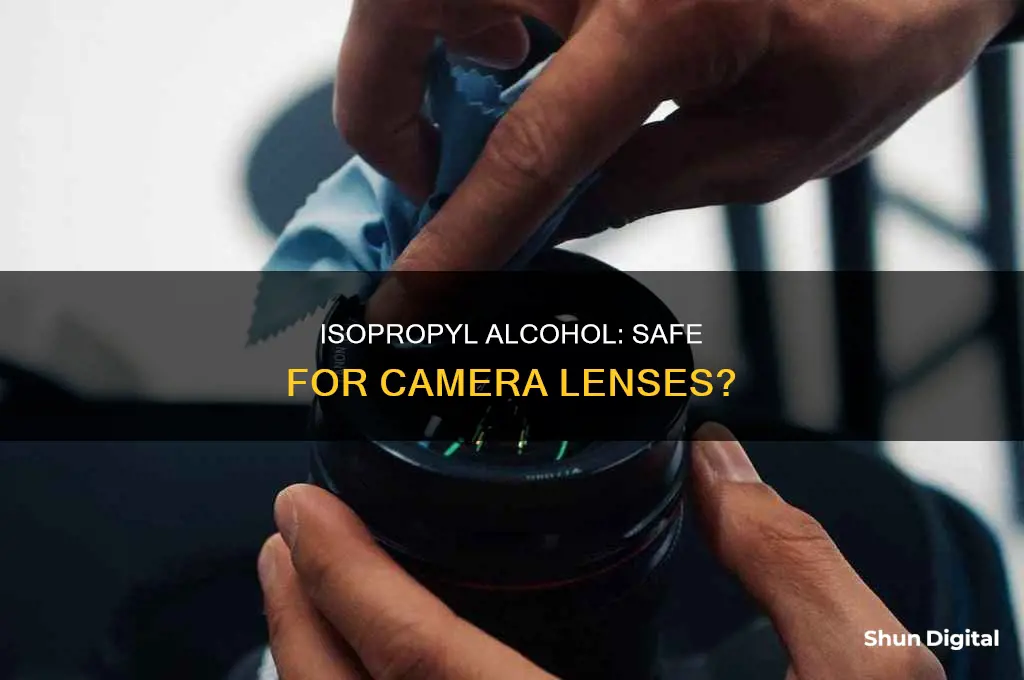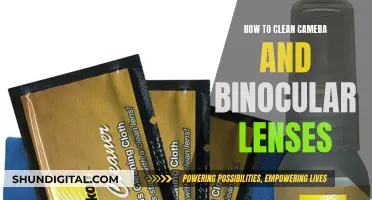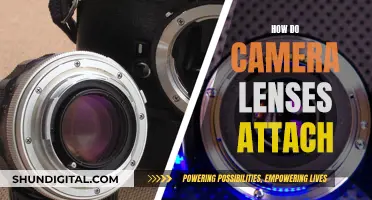
Isopropyl alcohol is a common ingredient in many lens cleaning fluids and is generally considered safe for use on camera lenses. However, there are some conflicting opinions on whether it could be harmful to lens coatings. While some people have used isopropyl alcohol without any issues, others prefer to use lens cleaning liquids that are alcohol-free to avoid any potential damage. It's important to note that lenses need to be significantly dirty before it will have a noticeable impact on image quality. Additionally, it's recommended to use a blower to remove loose debris before cleaning with a cloth or swab to reduce the risk of scratches.
| Characteristics | Values |
|---|---|
| Effectiveness | Isopropyl alcohol is effective at cleaning camera lenses |
| Safety | Isopropyl alcohol is generally safe to use on camera lenses, but there is a small chance it could affect some lens coatings |
| Dilution | It is recommended to use undiluted isopropyl alcohol, as diluting it with water will increase drying time and risk water damage to the lens |
| Application | Apply isopropyl alcohol with a blower, Q-tip, or cloth, being careful not to rub too vigorously to avoid scratching the lens |
| Alternatives | Other lens cleaning solutions, de-ionized water, and lens cleaning wipes are also effective and safe alternatives |
What You'll Learn

Isopropyl alcohol is safe for camera lenses
Isopropyl alcohol is a common and effective cleaner for camera lenses. It is often used by photographers and camera shops to clean lenses without causing any adverse effects. However, it is important to note that some people have claimed that repeated use of alcohol may dull the rubber of lens rings or camera bodies and the finish of LCD screens. Therefore, it is recommended to use it sparingly around these parts.
When cleaning lenses with isopropyl alcohol, it is best to moisten a cloth or paper towel and gently wipe the lens. Alternatively, a Q-tip dipped in alcohol can be useful for getting into small areas. It is important not to soak the lens, as this may cause trouble. Additionally, a blower can be used to remove loose debris from the lens before cleaning with a cloth to prevent scratches.
Isopropyl alcohol is also effective for cleaning lens contacts and camera bodies. However, it should not be used on aluminium coatings, as alcohol reacts with aluminium and can cause damage. Instead, acetone or methanol can be used for these surfaces.
Overall, isopropyl alcohol is a safe and effective cleaner for camera lenses when used correctly. It is important to follow the manufacturer's instructions and take the necessary precautions to avoid any potential damage.
Minolta Lenses: Universal Fit for Minolta Cameras?
You may want to see also

It is a good oil solvent
Isopropyl alcohol is a common and versatile household item. It is a powerful solvent that can be used to dissolve oils, greases, and grime. It is often used as a disinfectant and can be effective against bacteria, fungi, and viruses.
When it comes to camera lenses, isopropyl alcohol can be a safe and effective cleaning solution. Many camera and lens cleaning fluids on the market contain alcohol, so it is generally safe to use on camera lenses. However, it is important to use it properly to avoid any damage.
- Do not dilute the alcohol with water. Using diluted alcohol will result in a higher water content, which can take longer to evaporate and may leave streaks.
- Use a small amount of alcohol on a lint-free cloth or cotton pad to wipe down the lens. Avoid using too much alcohol, as you don't want it to seep into the lens or camera body.
- Avoid getting alcohol on any rubber or plastic parts, as it may discolour or damage them.
- Do not use alcohol to clean the sensor or any internal parts of the camera.
- Always dry the lens with a clean, soft cloth after cleaning with alcohol.
By following these tips, you can safely use isopropyl alcohol to clean your camera lenses and keep them free of dirt, grease, and fingerprints.
The Evolution of Camera Lenses: 8 to 10 mm Range
You may want to see also

It can be used to clean lens contacts
Isopropyl alcohol can be used to clean lens contacts. It is a good solvent and cleaner for oil and is safe to use on camera bodies and lenses. It is also effective for cleaning high-end optics and camera gear.
To clean lens contacts, use a Q-tip or cotton swab/square dipped in isopropyl alcohol to gently wipe the contacts. This will help remove any grease or fingerprints. Ensure that you do not rub too vigorously, as this can affect some lens coatings. It is also important to allow the alcohol to dry completely before using the camera again.
Isopropyl alcohol is a common ingredient in many lens cleaning solutions and is often used by camera repair shops. It is typically safe to use on camera lenses and is effective at removing smudges and fingerprints. However, it is always recommended to exercise caution when cleaning camera lenses and to follow the manufacturer's instructions.
Additionally, it is important to note that isopropyl alcohol should not be used on aluminium-coated mirrors, as alcohol reacts with aluminium and can cause damage.
Cleaning Camera Lenses: DIY Home Solutions
You may want to see also

It is safe to use on camera bodies
Isopropyl alcohol is a safe and effective cleaner for camera bodies. It is a good solvent and can be used to clean oil from surfaces. It is also a common ingredient in many lens and camera cleaning fluids.
When cleaning camera bodies, it is important to use a small amount of isopropyl alcohol on a cloth or Q-tip to avoid getting the solution inside the camera. It is also important to avoid vigorous rubbing, as this can affect some lens coatings. Additionally, it is recommended to test a small amount of the solution on the camera body first to ensure it does not cause any damage or discolouration.
Isopropyl alcohol is a suitable alternative to other cleaning solutions, such as soap and water, chlorine bleach, non-chlorine bleach, and quaternary ammonium products. It is also a cheaper alternative to other alcohol-based cleaning solutions, such as methanol and ethanol.
Some sources suggest that repeated use of isopropyl alcohol may dull the rubber on lens rings and camera bodies, or fog the finish of LCD screens. However, this is unlikely and depends on the specific camera model.
Overall, isopropyl alcohol is a safe and effective cleaner for camera bodies when used correctly and in small amounts.
Handcrafted Zeiss Lenses: Precision and Artistry in Optics
You may want to see also

It is a better option than ethyl alcohol
Isopropyl alcohol is a better option than ethyl alcohol for cleaning camera lenses. While both types of alcohol are effective at killing germs, isopropyl alcohol has several advantages that make it a preferable choice for this specific task.
Firstly, isopropyl alcohol evaporates more quickly than ethyl alcohol. This property is particularly advantageous when cleaning camera lenses, as it reduces the risk of liquid seeping into the lens or camera body and causing potential damage to electronic components. The faster evaporation rate of isopropyl alcohol helps ensure that the cleaning process is efficient and safe for your equipment.
Secondly, isopropyl alcohol is generally considered safer for use on the skin. While both types of alcohol can cause skin irritation in large quantities, ethyl alcohol tends to be more dehydrating and can leave your skin feeling tight and dry. Isopropyl alcohol, on the other hand, evaporates faster and is less likely to cause skin discomfort. This is especially relevant when cleaning camera lenses, as you may inadvertently come into contact with the alcohol during the cleaning process.
Additionally, isopropyl alcohol is commonly used as "rubbing alcohol" and is well-suited for cleaning electronics. Its effectiveness in breaking down proteins and lipids makes it ideal for removing grease and fingerprints from camera lenses. Many camera and lens cleaning fluids on the market contain isopropyl alcohol as an active ingredient, demonstrating its suitability for this purpose.
While ethyl alcohol may be more effective against certain types of viruses, such as hepatitis A or poliovirus, isopropyl alcohol still exhibits strong viricidal activity. It is effective against a wide range of common bacteria and resistant bacteria, including E. coli, Staphylococcus Aureus, and MRSA. Isopropyl alcohol's ability to disrupt the protein and lipid structure of bacterial and viral cell walls makes it a powerful disinfectant.
Furthermore, isopropyl alcohol is less likely to cause damage to certain types of coatings on camera lenses. While it is always important to exercise caution when cleaning coated lenses, some users have reported accidental removal of AR coatings when using ethyl alcohol. This risk is mitigated by opting for isopropyl alcohol, which has a lower chance of damaging lens coatings.
In conclusion, when it comes to cleaning camera lenses, isopropyl alcohol is the preferred choice over ethyl alcohol. Its faster evaporation rate, skin-friendly properties, effectiveness in cleaning electronics, strong disinfecting power, and lower risk of damaging lens coatings make it a safer and more suitable option.
Insuring Rented Camera Lenses: A Quick Guide
You may want to see also
Frequently asked questions
Yes, isopropyl alcohol is safe to use on camera lenses. It is a good solvent and cleaner, and many people use it without any ill effects. However, some people prefer to use lens-cleaning solutions that are alcohol-free, such as Zeiss, as there are some conflicting opinions on whether alcohol might harm lens coatings.
A concentration of 60% or higher is very effective. Some people use 99% isopropyl alcohol, but this may be too strong and could potentially affect some lens coatings. It is recommended to use 10-15% laboratory-grade or HPLC-grade IPA.
Do not soak the lens. Moisten a Q-tip or a cloth with the alcohol and gently wipe the lens. You can also use a lens pen to remove any remaining residue. Be careful not to get the alcohol inside the camera.
Yes, there are several other options for cleaning lenses, including lens-cleaning solutions, soap and water, lens pens, and lens wipes. Blowing off dust with a rocket blower or a similar tool before cleaning can also help prevent scratches.
Yes, isopropyl alcohol can be used to clean other parts of your camera, such as the lens barrel, camera rubber, and light stands. However, be careful not to get it on LCD screens or rubber grips, as it may cause dulling or discolouration.







